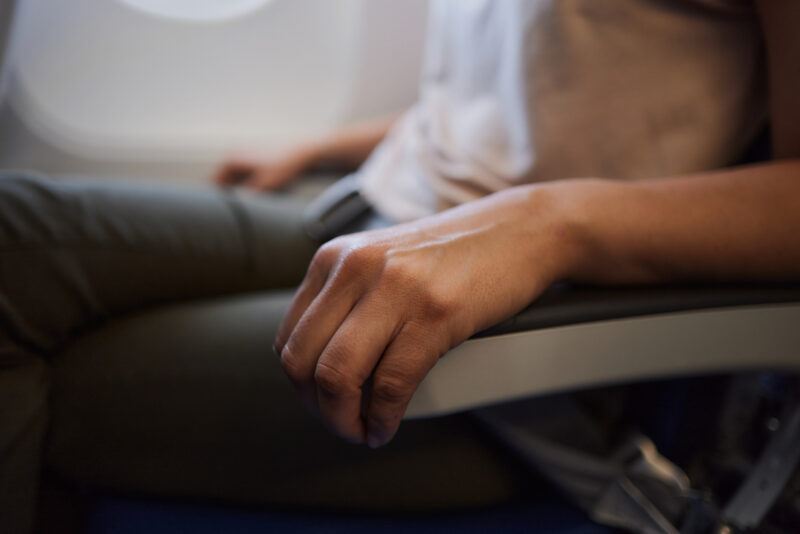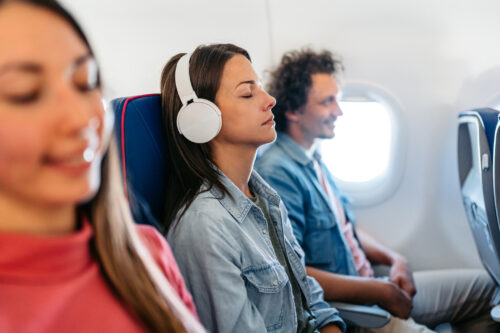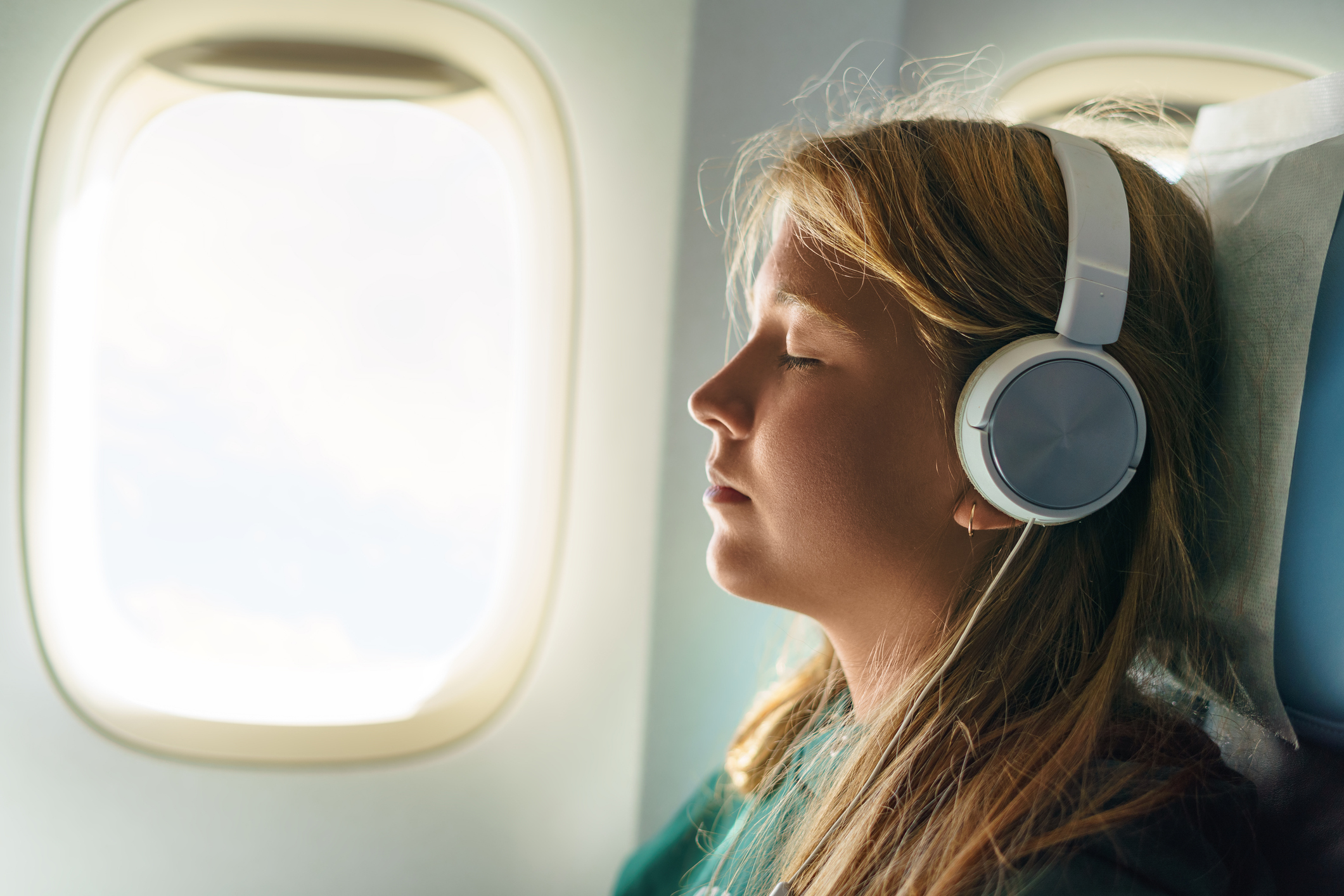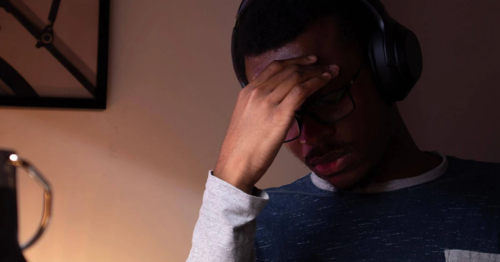
Table of Contents
How to Overcome Flight Anxiety, According to Therapists

Written By: Sarah Fielding

Clinically Reviewed By: Brooke Cortez
September 24, 2025
6 min.
Expert-approved tips for how to get over flight anxiety.
Learn more about our Clinical Review Process
Table of Contents
Flying can be a stressful experience for many people. You may find yourself feeling stressed, worried, or anxious when picturing getting on airplanes. Flight anxiety can be incredibly challenging, and even limiting, making you less inclined to travel or creating tremendous stress around the process.
Fortunately, there are ways to manage flight anxiety. To do that requires learning things such as what causes it and effective coping mechanisms. With that said, here’s what you need to know about flight anxiety.

Don’t let flight anxiety hold you back
Virtual treatment to help you get over flight anxiety and other anxiety-related conditions.
What causes flight anxiety
To learn how to get over flight anxiety, you need to figure out what’s causing it. As Charlie Health Group Facilitator Bree Williams, LPCA, puts it, “Flight anxiety — also known as aviophobia — can stem from a variety of sources.”
According to Williams and Charlie Health Licensed Creative Arts Therapist Courtney Way, MA, LCAT, flight anxiety stems from factors including:
- Fear of turbulence or bumps while flying
- A lack of control while flying
- Past negative experiences in the air
- Overall stress of air travel
- Hearing about safety incidents or a plane crash
- Unknowns, such as delays
What mental health conditions contribute to flight anxiety?
A mental health condition can also cause flight anxiety in some situations.
1. Generalized anxiety disorder
Someone living with a generalized anxiety disorder (GAD) is certainly prone to worry. They might translate this pattern into worries about and overall anxiety about flying, says Williams.
2. Panic disorder
A type of anxiety disorder, panic disorder is characterized by experiencing panic attacks, even when no danger is present. A person living with panic disorder can face anxiety about experiencing a panic attack during the flight and not being able to leave, says Williams.
3. Post-traumatic stress disorder
A person living with post-traumatic stress disorder (PTSD) has experienced or witnessed trauma. They can experience a fight-or-flight response after the trauma has subsided. According to Williams and Way, a person living with PTSD might have flying as a trigger, especially if they’ve had a frightening past flight.
4. Phobias
The experts explain that living with a phobia can also cause flight anxiety. For instance, a person living with claustrophobia (fear of confined spaces) or acrophobia (fear of heights) can experience flight anxiety.

How to get over flight anxiety, according to therapists
Here are five expert-approved tips to make coping with flight anxiety easier.
1. Prepare
It’s rare that you’ll be taking a flight at a moment’s notice. Preparing for your trip can go a long way toward calming your anxiety. This process can involve things like picking a seat or coming up with a plan for if your plane is delayed, says Charlie Health Group Facilitator Nicole Lonano, M.S. Maybe a window seat is better so you can look out the window during takeoff and landing. Alternatively, you might not want any view and prefer an aisle seat. It’s about preparing and finding the right strategies for you.
You may also want to take the time to learn about air safety. Williams recommends learning about things like turbulence and overall flight safety. Learning more about how a commercial plane works and the safety procedures can be tremendously helpful.
2. Get comfortable
Unless you’re in first class — and even then — flying isn’t the most restful experience. Make yourself comfortable, especially if on a long-haul flight, by bringing comfort items like snacks or a favorite blanket, says Williams. You can also create a playlist ahead of time featuring some of your most calming music and bring big headphones that bring you into your own world.
3. Do grounding practices
You can use grounding practices to calm your mind and body both before and during a flight. These techniques can include breathing exercises, such as the 4-7-8 method. You can also try the 5-4-3-2-1 method, in which you register five things you can see, four you can touch, three you can hear, two you can smell, and one you can taste. The latter can be especially helpful at anchoring you to the present, says Williams. You might even want to try guided meditations.
4. Distract yourself
Sometimes it’s all about focusing on something other than your anxious thoughts. Lonano and Way recommend distracting yourself with music, a comfort movie, or reading. Let yourself get engrossed in entertainment and relaxation for as long as you can.
5. Attend therapy
Therapy can be an important tool in coping with flight anxiety. You can consider techniques such as exposure therapy (with the professional help of a certified mental health professional), cognitive behavioral therapy (CBT), or virtual reality exposure programs. According to Williams, these options “can gradually desensitize fear and reframe anxious thought patterns.”
In certain instances, a person with a severe fear of flying or someone diagnosed with aerophobia may benefit from medication, in addition to therapy. Seeking professional help from a psychiatric provider can be the first step in getting medication to help cope with flight anxiety.
How loved ones can help with flight anxiety
On the flip side, you might find yourself traveling with an anxious flyer. While this doesn’t put the onus on you to stop their anxiety, there are steps you can take to support them.
“Loved ones can help by being a supportive, calm, reassuring, and grounding presence to help reduce stress and feelings of isolation,” says Way. While each individual’s needs are unique, here are some ways you might be able to help a loved one with flight anxiety.
1. Touch base ahead of the flight
Open communication is important if you haven’t flown together before, but know that they experience flight anxiety. According to Lonano, you can try having a conversation with them about their specific fears and triggers before you start your travels. This discussion can also include potential coping strategies, whether new ones or techniques they’ve used before, and what comforts they might want to pack for the flight.
2. Stay calm
The experts all stress that you are a foil to their anxiety and can offer a calming presence in the face of their intense anxiety. In the lead-up to the flight, you can be a stabilizing presence, offering practical help such as carrying their luggage, completing check-in, locating your gate, and boarding together.
3. Validate them
Now is not the time to pass judgment or dismiss their feelings as an irrational fear, says Way. Instead, Williams recommends telling your loved one something like, “I know this is hard, but I’m here with you.” You’re not feeding their fear; you’re acknowledging its presence and that they have you as a support.
4. Help with grounding practices
It can be challenging to remember helpful coping techniques during moments of intense anxiety. You can serve as a guide through deep breathing and grounding exercises, says Williams. This dynamic can be especially beneficial if they’ve preemptively relayed certain techniques they find helpful.
5. Respect their needs
At the end of the day, everyone copes differently. As Williams puts it, “Some people may want to talk through their anxiety, while others may prefer quiet or distractions like reading or listening to music.” Let them be the guide and support them as best you can.

How Charlie Health can help
If you or a loved one is struggling with a mental health disorder, Charlie Health is here to help. Charlie Health’s virtual Intensive Outpatient Program (IOP) provides more than once-weekly mental health treatment for dealing with serious mental health conditions, including anxiety. Our expert clinicians incorporate evidence-based therapies into individual counseling, family therapy, and group sessions. With treatment, managing your mental health is possible. Fill out the form below or give us a call to start healing today.
References
https://medlineplus.gov/panicdisorder.html
https://medlineplus.gov/posttraumaticstressdisorder.html




